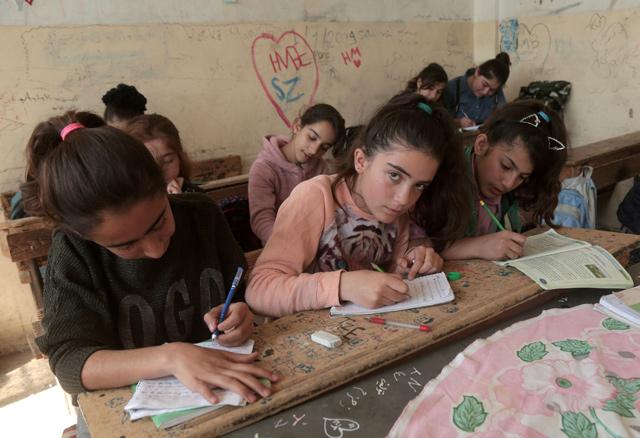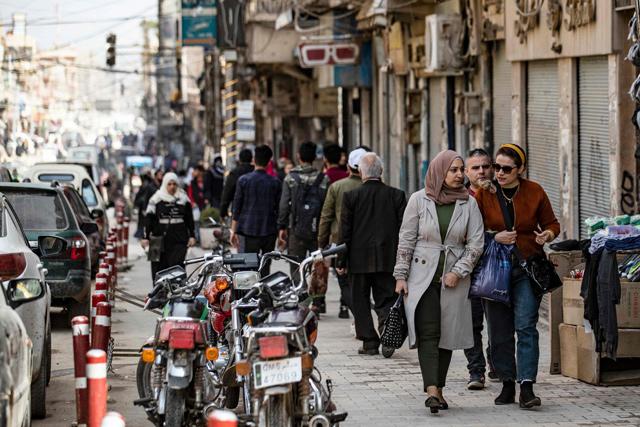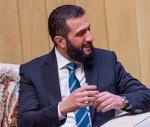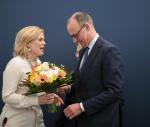You are here
For Kurds in Syria, world novels finally speak their language
By AFP - Feb 06,2017 - Last updated at Feb 06,2017
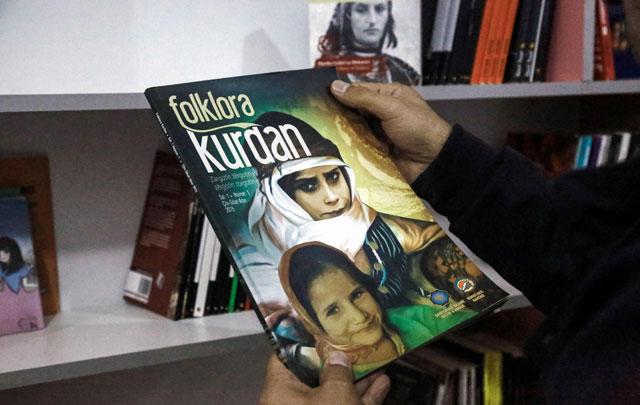
A Kurdish man carries a book on Kurdish folklore at a library in Kurdish-majority Qamishli in northeast Syria on January 11 (AFP photo)
QAMISHLI, Syria — Abdo Shehu sits in an office in Kurdish-majority Qamishli in northeast Syria, surrounded by copies of the first Western novel available in the city in his own language.
The novel is “Snow” by French writer Maxence Fermine, the first fruits of a new project to translate international works of literature into a language that was effectively banned in Syria until recently.
The 29-year-old is working as part of the “Hunar” project, named for the Kurdish word for pomegranate, launched two months ago to translate literature into the Kurdish language in Kurdish-majority parts of Syria.
For years, Syria’s Kurds were banned from using their language in official settings and prevented from learning it in schools or publishing magazines or books in the tongue.
The restrictions were parts of a larger programme of constraints placed on Kurds, who make up around 10 per cent of Syria’s pre-war population, including depriving them of Syrian nationality.
“I spent three months in a prison in Damascus in 2009, and was threatened with expulsion from university, because I was found with books in Kurdish,” said Shehu.
“Our language and our culture were banned by the authoritarian Baath Party, which wanted to get rid of the Kurds and their culture,” he added.
But Syria’s central government no longer has much sway over the Kurdish-majority regions of the country, in the north and northeast.
‘Very few authors’
It withdrew its security forces from Kurdish-majority regions in 2012, a year after the uprising broke out against President Bashar Al Assad.
And since then, the Kurds have walked a careful line between the government and rebels, while focusing on building a semi-autonomous region.
Kurdish officials have reclaimed their tongue, reintroducing the Kurmanji dialect of their language into the school curriculum and restoring Kurdish names to villages and towns.
The project has already translated three more works, including “The Epic of Gilgamesh”, a poem from ancient Mesopotamia and among the earliest known literary writings in the world, from Arabic, and a study of the Kurdish people, from English.
Those books will soon go into publication, and work will continue with new volumes, which are chosen by a committee that weighs various criteria, including whether the works are relevant to Kurdish life.
It is a non-profit initiative, and funded by private donors, with translators working on a volunteer basis.
The translated version of “Snow” has already gone on sale, for just over one US dollar a piece, enough to cover the costs of printing, according to Shehu.
After translation, each work is reviewed by a committee for approval, which tried, without success, to reach Fermine to obtain copyright permissions before publication began.
After decades of marginalisation, today very few Kurdish authors write in their mother tongue, encouraging avid readers like Shehu to translate works from other languages.
“There are only very few authors who write literature in Kurdish,” writer Hussein Zido, 45, said.
“Kurds never obtained their cultural, social or political rights throughout their long history in the Middle East,” he said.
The “Hunar” project aims to save the Kurdish language from extinction by translating books from the rest of the world into Kurdish, Shehu said.
“We’re doing our best not only to translate literature, but also philosophy and thought... so that Kurds can read world literature in their mother tongue.”
To swell the body of homegrown books, Malfa Ali, one of the founders of the project, is also compiling traditional Kurdish folktales and songs to put them into print.
The 37-year-old said he spends long exhausting hours collecting these tales directly from the storytellers themselves.
They have never been formally recorded because publishing Kurdish-language books was forbidden.
“We’ll start gathering all the stories told in the area and then we’ll move on to the songs,” he said.
The project also hopes one day to produce a complete dictionary of the Kurdish language, including words and phrases from the tongue’s spoken form.
Protecting Kurdish
Kurdish areas have seen a cultural revival since 2012, with new cultural associations and magazines taking life.
Syrian authorities forced the Kurdish magazine “Sormi” to close down in its original Arabic-language form in 2008, but since the uprising it has reopened, this time publishing in Kurdish.
The latest issue of the bi-monthly, which relaunched in 2015 offering readers articles by Kurdish authors, is themed “Identity and Language”.
“The Kurdish language is the first thing we have to protect. It never had its chance before, despite representing the identity of a whole people,” said Abbas Musa, a member of the magazine’s editorial team.
“We’re striving to offer something different and varied to those interested in culture,” he said of the magazine, which is published in Qamishli and distributed in two other cities.
The 31-year-old said he hoped highbrow articles in Kurdish would show his mother tongue is “not weak”.
Fellow “Sormi” editor Bahar Murad, 39, also translates children’s stories from English to Kurdish.
In his office at the culture magazine, he points to a recent translation of “Snow White and the Seven Dwarfs”.
He wants to see children reading in their mother tongue, he said.
“They’ve asked me to translate Little Red Riding Hood.”
Related Articles
QAMISHLI — When Eyub Mohamad was a boy, security forces beat his father into paralysis.
BEIRUT — Syria's decade-long war has seen the country's Kurdish minority make strides towards autonomy while becoming a key ally of the West
AMMAN — Marking World Arabic Language Day, which is celebrated every year on December 18, Jordanians express their mother tongue’s importanc


